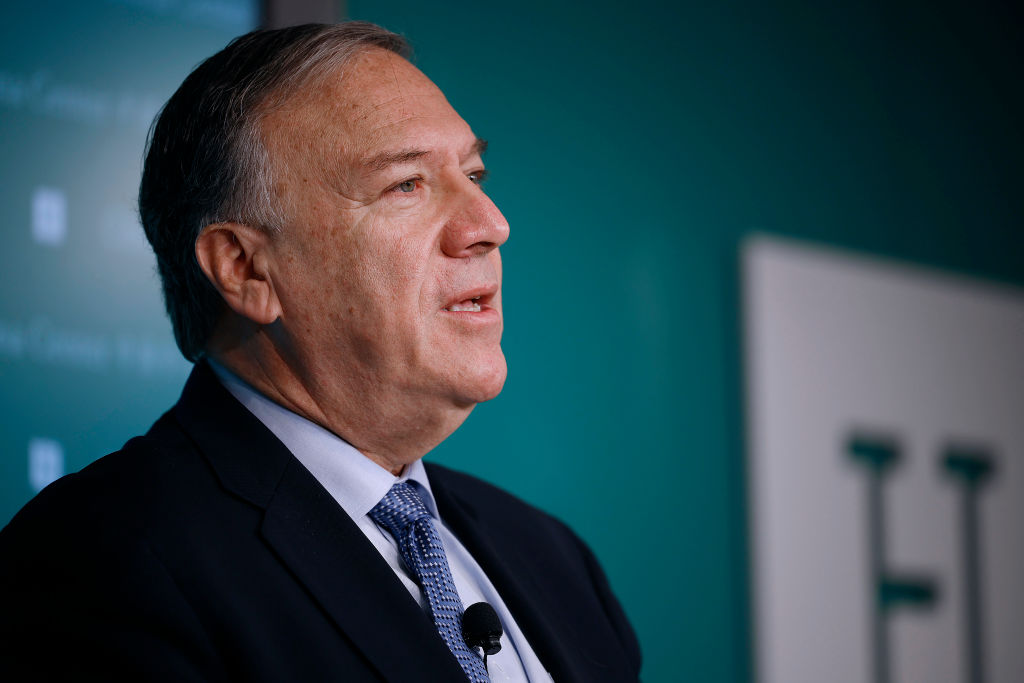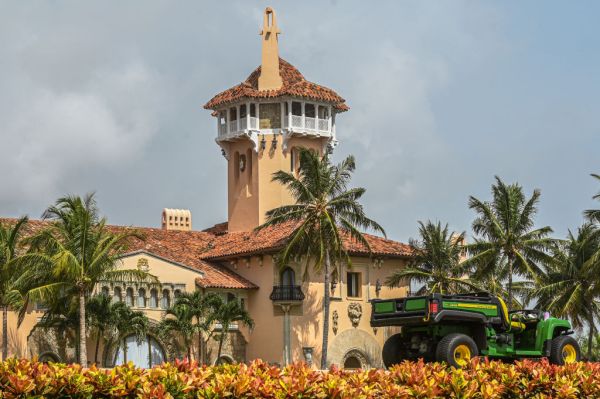Happy Monday! Welcome to Dispatch Politics, our newsletter chronicling the American contest for political power. In the months ahead, we’ll bring you blow-by-blow coverage of the storylines that matter as new candidates gear up to sell the public on why they’re the ones we’ve been waiting for. We hear the 2024 election is going to be a big one. Let’s get started.
Up to Speed
- Former President Donald Trump hit the presidential campaign trail this weekend, venturing out from his Mar-a-Lago compound for stops in the key early states of New Hampshire and South Carolina. He used those appearances to fire shots at potential rival Florida Gov. Ron DeSantis and roll out high-profile endorsements in both states—Sen. Lindsey Graham and Gov. Henry McMaster in South Carolina and outgoing state party chair Bill Stepanek in New Hampshire. (Notably absent from Trump’s New Hampshire event: Gov. Chris Sununu, who tells The Dispatch he’s mulling a presidential run of his own.)
- Republican National Committee Chair Ronna McDaniel was elected to a fourth term on Friday, cruising to victory with 111 votes to challengers Harmeet Dhillon, a national committeewoman from California who won 51 votes, and MyPillow CEO Mike Lindell, who won four. The secret-ballot election came amid deep fractures among Republicans about how the party handled the 2020 election and last year’s lackluster midterm elections, when Republicans underperformed historical trends, failing to flip the Senate and only narrowly retaking the House.
- Democratic California Sen. Dianne Feinstein—who, at 89, is the oldest member of the Senate, and whose reportedly declining mental faculties have been the subject of intense scrutiny—hasn’t yet announced that she won’t seek another term. But the Democratic race to replace her is already starting to get crowded. Rep. Adam Schiff, who built a national profile during the Trump presidency as the top Democrat on the House Intelligence Committee and manager of Trump’s first impeachment trial, announced his candidacy for the seat last Thursday—the same week House Speaker Kevin McCarthy kicked him off the committee for pushing the later discredited Steele dossier. Schiff’s announcement comes weeks after Rep. Katie Porter, an Orange County progressive darling close to Sen. Elizabeth Warren, announced her own bid for Feinstein’s seat. Democratic Rep. Barbara Lee is also reportedly eyeing a bid.
Pompeo: ‘I Don’t Think I Have Any Classified Documents’
Has Mike Pompeo scoured his office and home recently for classified documents?
Has the former secretary of state been contacted by the National Archives and Records Administration (NARA) or the Department of Justice (DOJ) as a part of investigations into potential improper possession of classified materials that now stretch from former President Donald Trump to current President Joe Biden, and that might now include former Vice President Mike Pence?
Pompeo would not say.
“I’m not going to talk about all the things I do. I’m in my home every day. I’m constantly scanning,” the former high ranking Trump Cabinet official told The Dispatch last week, adding, regarding any possible contact from federal authorities: “I’ve never talked to you about things like that. I don’t intend to, today.”
But in a wide-ranging interview to discuss his political future, American foreign policy and his new book, Never Give an Inch: Fighting for the America I Love, Pompeo did concede to conducting a sweep at some point to make sure he did not have any classified documents left over from his tenure running the State Department and the Central Intelligence Agency.
“I’ve looked. I don’t think I have any classified documents,” he said.
In a redux of the 2016 election (remember Hillary’s emails?), questions concerning the handling of classified material have become an early flashpoint of the 2024 cycle. Last August, after a lengthy back-and-forth with NARA and the DOJ, the FBI searched Trump’s Mar-a-Lago residence in Florida, seizing dozens of documents with classification markings. Biden responded by pondering in an interview how “anyone could be that irresponsible.” Yet in November the president’s lawyers discovered documents with classified markings in a D.C. office he occasionally used after his second term as vice president ended. This month, more classified documents were found in the garage of Biden’s Wilmington, Delaware, residence. And last week, news broke that Pence, too, had found a number of classified documents at his own Indiana home.
Pompeo blasted Trump, Biden, and Pence for failing to take document security more seriously.
“What we were finding is these folks were just careless with these documents,” Pompeo said. “And my interest is this: This isn’t partisan. This is not even political. Every one of us who handles classified information has a responsibility to do everything they can to make sure it stays exactly where it’s supposed to.”
Biden has said he does not regret how he has handled classified documents since his eight years as Barack Obama’s vice president expired—which prompted a subtle dig from Pompeo.
“If you screw it up—because we are all human—if you screw it up, find it, get it back where it’s supposed to go, take responsibility for it. Don’t blame your team; don’t blame your staff. By the way, don’t say you don’t have any regrets,” Pompeo said. “If somebody found a document that wasn’t where it was supposed to be and it was my fault, I would regret that. I might have put somebody’s life at risk, for goodness’ sake.”
This topic is more than theoretical for Pompeo. Before Trump tapped him for secretary of state, the former Kansas congressman was director of the CIA, handling the country’s most sensitive national-security secrets. A screwup on his part could have endangered American lives—our spies and soldiers on the front lines and citizens here at home.
“I had a [Sensitive Compartmented Information Facility] in my home, a secure facility in my own home when I was the CIA director, when I was a secretary of state. I was pretty rigorous. Documents not only went in the SCIF, but when I left the SCIF at night, they went into, there’s a safe that’s inside of the SCIF,” Pompeo said. “If we got it wrong or there’s a document someone thinks is classified because of what it contains and there could even be a dispute, we ought to make sure we try and figure it out and get it right.”
Never Given An Inch is hardly an overwrought exercise in settling scores, commonplace in books written by veterans of presidential administrations. But there are a few on the receiving end of the literary Howitzer Pompeo wields in his book. Chief among them is Nikki Haley, the former South Carolina governor, former U.S. ambassador to the United Nations in the Trump administration, and possible competitor for the Republican Party’s 2024 presidential nomination.
In Never Give An Inch, Pompeo is withering in his criticism of Haley. He calls her a “bit player” in the Trump administration and derides her as a two-time quitter: first for quitting on the people of South Carolina when she resigned as governor to accept the ambassador post in 2016, then for resigning that job in 2018 to pursue private employment and launch her own political operation.
“I have no time for people who when in the fight, in the moment, in the battle are given an incredible opportunity to serve America and walk away from it,” Pompeo told The Dispatch. “I wasn’t about to leave. Others made different choices. They’ll have to explain why they made those choices.”
“It was hard to be in the Trump administration,” Pompeo added. “There were lots of folks urging people in the administration, you should leave—save yourself. I never thought about that for a second, and I don’t have any time for anybody who actually thought that way.”
Asked for comment, Haley’s team referred us to her recent interview with Fox News’ Bret Baier. “It’s really sad when you’re having to go out there and put lies and gossip to sell a book,” Haley said. “That’s exactly why I stayed out of D.C. as much as possible—to get away from the drama.”
For more from David’s interview with Pompeo, see his piece on the site today.
Keeping the Peace at the RNC
DANA POINT, California—Moments after Ronna McDaniel was reelected to a record fourth consecutive term as chairwoman of the Republican National Committee on Friday here at the RNC’s Winter Meeting, she called to the Waldorf-Astoria ballroom stage her two challengers—attorney and California RNC member Harmeet Dhillon and MyPillow CEO and election conspiracy theorist Mike Lindell—to applaud their contributions to Republican politics.
“We’ve gotta get Mike and Harmeet up here,” McDaniel said. “Thank you for the race you ran, for the leaders you are in our party—we are so grateful for you. I can’t say enough wonderful things about Mike and Harmeet.”
The gesture of unity was significant. This year’s contest to run the billion-dollar national party organization had been an unusually high-profile and polarizing affair. Dhillon announced in early December that she would run for chair, arguing that the party had grown stagnant under McDaniel’s leadership: underperforming in elections, spending too much on consultant kickbacks, and losing touch with grassroots voters. She took her case straight to those grassroots, making appearances on Tucker Carlson’s Fox News show and Steve Bannon’s podcast, attracting endorsements from MAGA personalities including Turning Point USA’s Charlie Kirk and former Arizona governor candidate Kari Lake.
Grassroots activist and Dhillon supporter Scott Presler gave GOP insurgents an outlet for their enthusiasm, publishing a “Hire Harmeet” website that included email addresses and Twitter handles for all 168 voting members of the RNC. (That body is constituted of three-person delegations from all 50 states, the five U.S. territories, and D.C.) Party officials found themselves buried in a blizzard of pro-Harmeet communications.
That wasn’t enough to overcome existing support within the party infrastructure for McDaniel, who had moved fast to lock up the necessary votes after the midterms: More than 100 members signed a letter of support for McDaniel before Dhillon even got into the race. Voting members who spoke to The Dispatch ahead of the vote had varied reasons for wanting to stay the course: Some appreciated McDaniel’s work to support party infrastructure even in smaller and bluer states, some were skeptical of Dhillon’s slash-and-burn allies like Lake, and some said they were sticking with experience going into a presidential year. In the end, McDaniel captured almost two-thirds of the vote.
“We heard you, grassroots,” McDaniel said from the stage. “We know. We heard Harmeet. We heard Mike Lindell. But with us united and all of us going together, the Democrats are going to hear us in 2024 when we take back the White House and the Senate.”
Speaking to reporters after the vote, Dhillon sounded less convinced. “The party is not united,” she said. “But it’s our job to try to unite the party, and that’s gonna mean changes at the RNC. Nobody’s gonna unite around the party the way it is, which is seemingly ignoring the grassroots of the party, refusing to take the steps necessary to help us actually win.”
What those changes might be isn’t totally clear. Certainly McDaniel will be unable to please both Dhillon and Lindell, who on the key issue of “election integrity” have diametrically opposite recommendations. Dhillon has called for Republicans to keep step with Democrats by increasing party support for early voting and even—where legal—ballot harvesting. Lindell, who has built his brand around conspiratorial claims that any election using electronic voting machines can be rigged by Democrats—and who is currently facing a $1.3 billion defamation lawsuit from election-hardware company Dominion Voting Systems—insists Republicans should settle for nothing less than one-day elections conducted entirely by paper ballot.
That the Republican Party remains deeply divided isn’t news. But one fascinating thing about the RNC chair squabble was the unusual political lines of the split. In recent years, it’s been common to think about intra-Republican fights as contests between the old establishment and Trump’s guerilla MAGA wing—but this wasn’t that. For one thing, the RNC as a whole has already been largely remade in Trump’s image: As the New York Times noted last week, 99 of the body’s 168 members were first elected by their state parties in 2016 or later, with old Bush and McCain allies cast aside by the dozens to make way for new blood.
Moreover, Trump and McDaniel remain allies: The former president congratulated her on Truth Social following her victory, echoing her call for party unity against the Democrats. And Dhillon counted among her supporters some of the RNC’s staunchest Trump skeptics, like New Jersey committeeman Bill Palatucci. In fact, Dhillon made McDaniel’s closeness with Trump a significant line of attack, pointing out that top Trump aides were whipping votes for the incumbent, arguing McDaniel was too close to the former president to remain neutral in the 2024 primary.
This dynamic crystallized the day before the vote when Florida Gov. Ron DeSantis—Trump’s top likely challenger in that primary—told The Charlie Kirk Show “we need to get some new blood in the RNC” and “I like what Harmeet Dhillon has said.”
But describing the contest as Trump and his RNC vs. a DeSantis-sympathetic grassroots opposition oversimplifies things too. The reality is that Trump, while still the most significant player in Republican politics, is no longer the irresistible gravitational force he has been for most of the last decade, and in receding he has left a vacuum. His wing of the party, the MAGA insurgents, are as loud and energized as ever. But for the first time, it’s not clear which politicians stand to benefit.
Eyes on the Trail
- McCormick Senate redux? In the latest sign he might challenge Democratic Sen. Bob Casey of Pennsylvania in 2024, former GOP Senate candidate Dave McCormick—who narrowly lost the Republican nomination last cycle to Dr. Mehmet Oz—is hosting a reception for Republican state legislators at the Pennsylvania GOP’s annual winter meeting.
- In Indiana, Jim Banks is all-in for Senate: GOP Rep. Jim Banks is wasting no time in his bid to succeed retiring Sen. Mike Braun. Neither is the Club for Growth. The anti-tax organization is already blasting former Indiana Gov. Mitch Daniels’ in television ads and op-eds, and its PAC, Club for Growth Action, has pledged to spend millions against him during the primary should he decide to run. Braun’s endorsement could also shake up the race. Speaking to The Dispatch at the Capitol last week, Braun spoke highly of Banks: “He represents his third district well, I think he’s got decent name recognition across the state, and he gets out there and tangles and wrestles a little bit with stuff.” Does he think Daniels will run? “I don’t know whether that’s gonna materialize or not. You hear hot and cold on it … I’m guessing the field will get a little crowded over time.”
- Karrin Taylor Robson eyes a Senate run: Now that progressive Rep. Ruben Gallego of Arizona has officially launched a 2024 bid against Sen. Kyrsten Sinema—who just cut ties with the Democratic Party—all eyes are on the Republican primary field. Potential candidates include former Senate candidate Blake Masters, former gubernatorial candidates Kari Lake and Karrin Taylor Robson, freshman U.S. Rep. Juan Ciscomani, and Pinal County sheriff Mark Lamb. An adviser to Robson—who lost the GOP gubernatorial nomination last cycle to Lake—confirmed to The Dispatch that she’s indeed weighing a 2024 Senate run: “Is there going to be a more traditional conservative who can cobble together a coalition and be viable in the general? There’s a few candidates who could make that claim and certainly Karrin is among them.”
Notable and Quotable
“I talked to her for a little while. But I said ‘Look, go by your heart, if you wanna run.’ She’s publicly said, ‘I would never run against my president. He was a great president.’”
—Donald Trump on Nikki Haley, Saturday, January 28
In Case You Missed It
David M. Drucker hit the ground running Saturday with his first story in The Dispatch, giving readers a primer on Haley’s forthcoming presidential campaign: “Nikki Haley is planning to challenge Donald Trump for supremacy atop the Republican Party—and she could make her 2024 presidential bid official as soon as next month. Haley possesses the architecture of a robust White House campaign operation through the Stand For America political action committee and Stand For America, a 501(c)(4) policy-focused political nonprofit organization. Trusted senior aides are already on board, prepared to step into positions directing political strategy, fundraising, communications, grassroots outreach, and policy development.”
Let Us Know
We at The Dispatch are past our pirate skiff days, but we’re still eager for your feedback on which directions you’d like to see this new newsletter go as we grow over the coming weeks and months. Thanks for reading!
Correction, 1/31/23: An earlier version of this newsletter misspelled Karrin Taylor Robson’s first name on second reference.











Please note that we at The Dispatch hold ourselves, our work, and our commenters to a higher standard than other places on the internet. We welcome comments that foster genuine debate or discussion—including comments critical of us or our work—but responses that include ad hominem attacks on fellow Dispatch members or are intended to stoke fear and anger may be moderated.
You are currently using a limited time guest pass and do not have access to commenting. Consider subscribing to join the conversation.
With your membership, you only have the ability to comment on The Morning Dispatch articles. Consider upgrading to join the conversation everywhere.